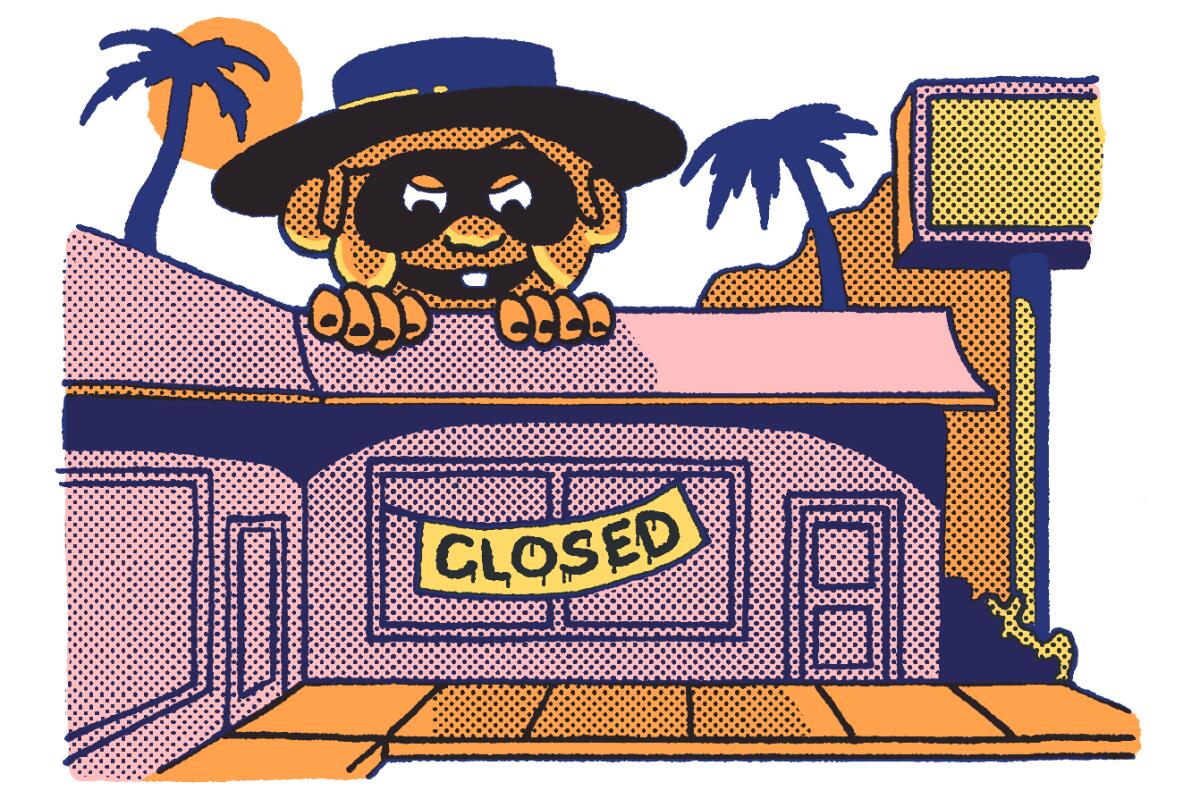Column: We cannot let giant chains take over the restaurant space

It’s already started happening.
- Share via
On a drive last week, passing dozens of closed small restaurants and other businesses, I saw one place that seemed to be operating as if we weren’t in the throes of a global health crisis: Chick-fil-A. There was a line at least eight cars deep, full of people waiting for chicken sandwiches and waffle-cut fries.
I’m not judging fast food or those who consume it (I’ve written effusively about it in the past). Times are uncertain and people need to eat, preferably cheaply, given the fact that they’re also worried about — or have already lost — their jobs. But our multibillion-dollar fast-food industry is equipped to weather this shutdown. Our small restaurants are not.
The sudden loss of so many restaurants has created an enormous empty space. The pandemic may have an unforeseen consequence: making us even more reliant on large corporations to feed us now and during the time ahead, and less able to extract ourselves from their grasp once the country reopens. Independent restaurant owners, already facing an uphill battle, will struggle even more to regain a foothold in the economy.
The big chains are positioned to assume an even greater role in our daily lives. The takeover has already started. We have to try to stop it.
The power vacuum is a geopolitical tale as old as time. To vastly oversimplify, when power and influence disappear overnight, there is confusion, followed by fighting (See: companies jockeying for the biggest piece of congressional stimulus). Ultimately, the power goes to those who were best positioned to move in.
It happened when Alexander the Great died; it happened when our government ousted Saddam Hussein’s regime. It happened when the Cold War abruptly ended in 1991 with the demise of the U.S.S.R and the number of global superpowers was reduced from two to one.
Of the nearly 647,288 restaurants in the U.S., chains account for 301,183, according to a 2018 study from market research firm NPD Group. The rest — slightly more than half — are independent restaurants. The non-essential business closures now enacted in more than a dozen states do not discriminate — multinationals and mom-and-pop stores alike are affected.
But while small restaurants nationwide are forced into mass layoffs, or to shut down entirely, chains are eager for even more market share: Pizza Hut is hiring 30,000 new workers to keep up with demand. Papa John’s is hiring 20,000. 7-Eleven, with 70,000 locations worldwide, announced on Friday that it’s hiring as many as 20,000 new employees. Domino’s, whose stock price has declined by about 12% over the last month as of this writing — modest, relative to the rest of the market — is hiring 10,000 new workers.
President Trump, who has filled the State Dining Room with stacks of Big Macs and Chick-fil-A sandwiches to greet college sports teams, recently held a joint call with executives from the fast-food industry, including the chief executives of Subway, Wendy’s and Yum! Brands (KFC, Taco Bell). No independent restaurants were on the call.
Meanwhile, small restaurants in L.A. and across the country are desperately trying to course-correct: Businesses like Ronan are making the unprecedented step to adapt their business models from full-service to exclusively delivery and curbside takeout; Compelling Coffee is offering wholesale prices on its products; restaurants like Porridge + Puffs are repurposing into provisions shops and mini-groceries to help pay the bills.
But for some, transformation isn’t feasible, or tenable. Petit Trois, one of my favorite restaurants in the city, made the decision to simply close during the shutdown. Chef Ludo Levebvre said, “We did the best we could, but it no longer makes any sense, professionally or personally, to keep Petit Trois open as a to-go restaurant.” One gets the sense that some businesses, by offering things like cartons of eggs with takeout orders, are simply trying to reduce inventory before turning out the lights for good.
And that’s the tricky part: Once they’re off, you don’t simply turn the lights back on. Restaurants, like a film shoot or Broadway show, are powered by inertia; multiple moving parts must work together in order for the whole to function. While restaurants in Los Angeles County must legally remain closed until at least April 19, in reality, it’s likely longer — and even if they can reopen after that date, how soon will diners return after a month in isolation and exile, and with a tanking economy?
Patrick Nye, regional director of the Los Angeles Small Business Development Network, spoke of the precarious nature of many independent enterprises. “On average, most small businesses only have 15 days’ worth of cash flow. If you’re forced to completely close and have no revenue coming in, that essentially starts the clock on that 15 days,” he said. “It’s just not that much runway.”
Nye said the economic foundation of the country is small businesses.
“The whole American Dream is based on the entrepreneurial spirit,” he said.
Nye encouraged small businesses in difficult financial straits to call his office for a consultation, cost-free. “These are truly the job generators for most of our economy. They just don’t have the political pull some of the larger industries do.”
There is no easy solution. If the history of this country is to be at all believed, bailout money will go mostly to line the pockets of the already wealthy. So, it’s up to us. Shop small. If you can, eat from locally owned businesses. Buy gift cards. Get takeout and tip generously. If your largesse is larger than most, consider going to sites like serviceindustry.tips and directly giving out-of-work industry workers some cash relief. Lobby local government to provide help for small business owners.
The jobs large companies are providing are not to be taken for granted. They are essential if we’re going to get through this crisis. But small business is the backbone of this nation, and it’s currently in grave peril.
More to Read
Eat your way across L.A.
Get our weekly Tasting Notes newsletter for reviews, news and more.
You may occasionally receive promotional content from the Los Angeles Times.











